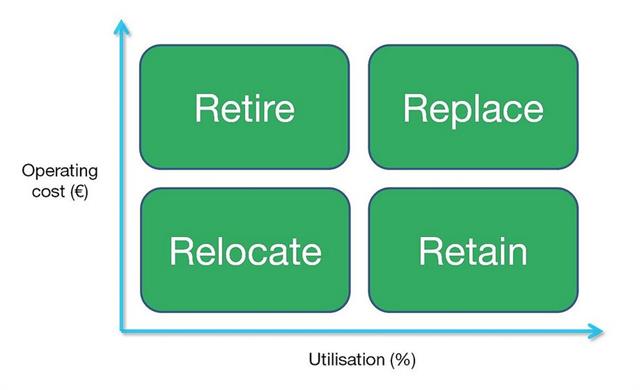 The diagram, when to retire, retain, replace or relocate a truck - based on utilization and operating cost. |
No matter the quality of your forklift truck, after a few years of service in a busy and fast-moving warehouse, it's not going to have quite the same performance as it did when it was brand new. Productivity and efficiency in the warehouse can really suffer once a forklift becomes too unreliable, and the time will always come when you need to replace it. But how do you know how long a forklift should last? And are there any alternatives to replacement? International forklift truck manufacturer
UniCarriers has assembled a simple guideline on how to decide - in the following four situations.
If utilisation is low, and operating costs are high - retireYou can feel confident that retiring the truck to bring down costs is the best move. If the long-term costs of maintenance begin to overtake the cost of new equipment, it's time to get rid of it. Through analysing your operation, you could probably find a better way to use resources than a truck like this.
If utilisation is high, and operating costs are also high - replaceIf you're not sure how long a forklift should last, this is the ratio you should be looking out for. A truck like this may have reached the end of its justifiable economic life, possibly due to reliability issues, which can mean frequent maintenance. This is a common problem with trucks which see a lot of use! However, a truck with high utilisation is clearly needed in the warehouse - so for this reason, replacing the forklift in some way would probably be your best option, especially if the cost of the replacement is less than the cost of maintenance on the older truck. The improved ergonomics, safety features and efficiency of modern equipment could help you save even more money.
If utilisation is low, and operating cost is also low - relocateYou don't have much reason to retire or replace this truck, since it's not costing you much money, and isn't being used heavily. However, if you look at your operation, you could see that this truck could be better used in a less busy area of your facility. A typical relocation would be moving a truck like this from a factory's distribution area over to production - where it may not be in constant use, and where it's not as critical. This option may good for older trucks, which are being replaced by newer equipment - they should be able to handle these less-intensive tasks in their old age.
If utilisation is high, and operating costs are low - retainYou're in a good position! It looks like this truck is aiding your work in the warehouse in a cost-effective way. For many warehouse managers, there would be few reasons to consider retiring or replacing a truck which fits this description.
Figuring out which of these situations you're in requires regular fleet review sessions with your supplier. After looking at things like maintenance costs and downtime, they'll be able to advise you on the best solution - you may even be able to get the same amount of work done with fewer trucks and at lower cost, if you decide to replace old machinery with more efficient and reliable new trucks.
But as we can see from the 'relocate' option above, a used forklift with many hours of use
isn't necessarily useless - it may still be able to perform other tasks well, possibly in less intensive or less frequent operations. If you're thinking about acquiring trucks to fulfil these kinds of tasks, the initial costs will be much lower if you choose used equipment.
A guide on how to reduce the TCO of a forklift fleet is available at UniCarriers
here.
For more information, please contact:
UniCarriers Europe AB
Tobias Laxa
+49 (0)170 371 0779
Send an email
www.unicarrierseurope.comUniCarriers is a globally active developer and manufacturer of industrial trucks. Its versatile, customisable transport solutions for logistics and warehouses are produced at its production facilities in Sweden, Spain, Japan, China and the US. Its products are sold at specialist retailers or directly to end customers by an experienced team of sales experts. Its main customers are in the automotive, construction, food, logistics and pharmaceuticals sectors, heavy industry and the processing industry.
UniCarriers was formed in 2011 following the merger of Nissan Forklift, TCM and Atlet. Since 2017 the brand has belonged to Mitsubishi Logisnext Co., Ltd. based in Kyoto, Japan. UniCarriers Europe AB, based in Molnlycke, near Gothenburg, Sweden, is a one-hundred-percent subsidiary of the Japanese corporation. With a portfolio comprising six brands, 11,000 employees and total sales of around 3.3 billion euros in the financial year 2017, Mitsubishi Logisnext is the world's third-largest forklift manufacturer.